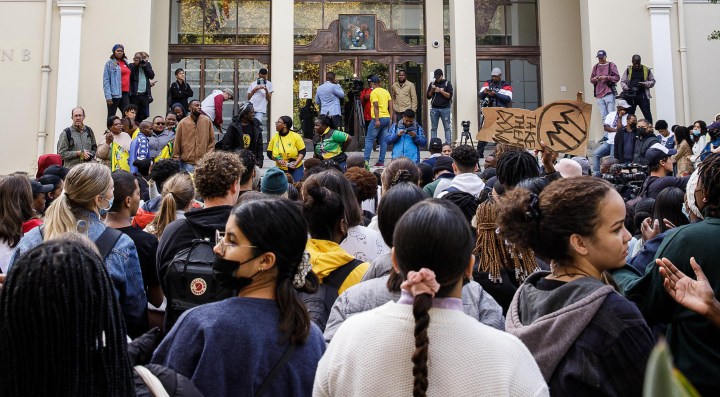ANALYSIS
Urination incident: Questions raised about Stellenbosch University’s commitment to its transformation project

The latest instance of racism to emerge from Stellenbosch University highlights a shortfall in bona fide commitment to its commitments.
‘What tends to happen is that [Stellenbosch University] is never short of commitments, but it is short of commitments to those commitments. It is also short of monitoring and evaluating implementation efforts.”
This is according to Professor Charles Ngwena, a professor of law at the Centre for Human Rights at the University of Pretoria, who spoke to DM168 about the incident that occurred at a Stellenbosch University residence, where a white student urinated in the room and on the study materials of a black student.
“I think we are entitled to surmise that the perpetrator was somewhat emboldened by the perception of what the institutional culture allows. [We need the university] to show that it’s bona fide by looking… at the institution itself more broadly, to reassure the learners, the student community, and to reassure South Africans that Stellenbosch is providing education in compliance with the tenets of the Constitution and within a non-discriminatory environment,” said Ngwena.
Babalo Ndwayana was asleep in his room at the Huis Marais men’s residence on Sunday morning, 15 May, when Theuns du Toit entered his room and urinated on his desk and possessions.
A video of the incident went viral on social media.
This is the video that’s been circulated showing a white student urinating on a black student’s belongings. He has since been suspended from Stellenbosch University.
For more: https://t.co/V94uwNfCMZ#StellenboschUniversity pic.twitter.com/UMC7Wl1rcf
— EWN Reporter (@ewnreporter) May 16, 2022
On 16 May, the university suspended Du Toit and removed him from the residence.
After an initial probe by the institution’s equality unit, university spokesperson Martin Viljoen told DM168 “the matter has been referred for a disciplinary hearing”.
“The decision has been communicated to the relevant parties. The implicated student is given 10 workdays’ notice of the disciplinary hearing in terms of the provisions of the disciplinary code, after which a hearing will be scheduled. Dates set for hearings consider all students’ academic responsibilities, including exams,” he added.
In addition to the internal investigation, police have confirmed that they are investigating the incident, and the South African Human Rights Commission has also said it will investigate the matter after receiving complaints.
This is not the first time the university has been embroiled in a race row.
In 2015, the documentary Luister centred on the exclusion of African students because of the role of Afrikaans at the university, and included interviews with students sharing their experiences of racism and other forms of discrimination at the institution.
Slow pace of change
In 2016, two white female students were suspended from the university pending the outcome of an investigation into an incident of blackface at a house-warming event at the Heemstede residence.
And in 2017, three students were suspended for putting up Nazi-inspired posters at the university.
The urination incident has raised concerns about the extent of transformation at the institution, with bodies such as the Council on Higher Education saying this is “also a time for strong introspection at the university”.
“To what extent is the transformation project fully under way and making progress at the university, or is this a sign of an institution and an institutional culture that remains largely untransformed?” the council’s CEO, Dr Whitfield Green, asked last week.
Frustration over the slow pace of transformation at the university culminated in the rise of Open Stellenbosch in 2015 – a movement of predominantly black students and staff established to challenge the oppressive institutional culture at the university.
Policies introduced by the university such as the Strategic Framework of 1999, the Vision 2012 document of 2000, the Transformation Strategy of 2008, and the Overarching Strategic Plan of 2009 “[had] all failed because of a wholesale lack of political will to implement them”, the Open Stellenbosch collective had argued in April 2015.
“Open Stellenbosch was successful in shifting the university’s language policy,” Faith Pienaar, an impact and accountability officer at the international non-profit organisation Civicus, told DM168.
Pienaar is a Stellenbosch University alumna and worked as a project coordinator in the university’s Institutional Transformation Office between 2015 and 2017.
The Language Policy 2016, which replaced the 2014 policy (which held Afrikaans as the primary language) was the outcome of a protracted campaign by students to ensure that the policy prioritised access, equal opportunity and support for all students and staff at the institution, Pienaar explained.
“It took students to identify what the problem was, mobilise around that problem, and then write a draft proposal, for the policy to change. There was no internal incentive for the university to change its policy until it was forced to do so,” she said.
However, while strides have been made towards a more progressive language policy as one of the university’s transformation and social cohesion strategies, the instances of racism that persist at the university suggest an institutional culture that is not transformed, said Pienaar.
“I don’t think the staff at Stellenbosch University are willing and skilled enough to meaningfully address institutional racism,” Pienaar said.
She added that a clear anti-racism stance is needed. “Everything is like putting on a plaster.
“An incident happens, an investigation is announced and then it pats itself on the back and says it’s done the right thing. I think it needs to be a lot more proactive.”
Committing to transformation
According to Viljoen, Stellenbosch University’s Transformation Plan was adopted in 2017. Transformation at the institution is further supported by policies and plans including the Employment Equity Policy and Plan of 2020, Code for Employment Equity and Diversity of 2019, Language Policy of 2016 (revised 2021), Student Disciplinary Code of 2016 and 2021, Admissions Policy of 2017, Disability Access Policy of 2018, Visual Redress Policy of 2021, and Staff Health and Wellbeing Plan of 2021.
The university has also promised to establish an external independent commission of inquiry into the incidents of racism and harassment related to racism at the institution, to be headed by a respected judge.
“We envisage an enquiry into incidents of racism, to report on and make recommendations to improve a culture of diversity, equity and inclusion,” Viljoen told DM168.
“This may include a review of our policies, operating procedures and responses to determine any gaps that may exist.”
As promising as this pledge may sound, Ngwena and Pienaar agreed that, for the proposed commission to be a tool to review and address structural racism at the institution, it must be headed by someone who “is credible and engenders confidence, particularly of black students”.
“One really can’t compromise on that,” said Ngwena.
Pienaar added that, although plans for an external commission sounded somewhat promising, she was not hopeful that it would result in positive reparation and change, “unless it’s accompanied by key accountability commitments”.
“I think it is a promising proposal, provided that there are key actions to which the public and the university key stakeholders can hold the university to account.”
Ngwena explained that, when there is a commitment to implement transformation, there ought to be credible processes for monitoring and evaluating where progress has or has not been made.
“If you’re serious about changing, you need to ask yourself after a certain period whether you have done what you are supposed to do, and if not, what were the challenges and how might they be overcome,” he said.
Read in Daily Maverick: “Acts of ‘spectacular racism’ distract us from our relentless diet of unspectacular racism”
On 26 May, Viljoen also confirmed that the university will be “working towards a compulsory module for all students that will speak to anti-racism, democracy and critical citizenship – supported by a strong academic foundation”.
“Elements of the module have already been piloted last year and are continuing into this year.”
According to Ngwena, a more effective way of transforming an institution is a participatory process, which requires it to include those on the receiving end of discrimination.
“Top-down approaches tend to yield cosmetic changes. I suspect that [Stellenbosch’s] processes are not inclusive enough, in a participatory way, otherwise you wouldn’t continue to have incidents such as this,” he said. DM168
This story first appeared in our weekly Daily Maverick 168 newspaper, which is available countrywide for R25.

[hearken id=”daily-maverick/9588″]


















 Become an Insider
Become an Insider
I would be interested to learn how all these activists feel about the quality of education at Stellenbosch University. From what I have heard it is excellent.
Like it or not all people hold prejudices, the writers included. Our role is to try to minimise the manifestation of the ugly face of this aspect of human nature, whilst keeping it in perspective.
Over reaction is as unhelpful as underreaction.